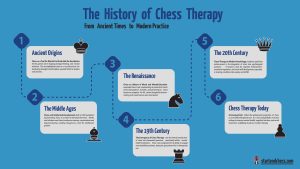The History of Chess Therapy: From Ancient Times to Modern Practice
The History of Chess Therapy is a fascinating exploration into how this ancient game has evolved into a powerful tool for mental and emotional well-being. Chess, often celebrated for its strategic depth and intellectual challenges, has transcended its role as a mere game to become an effective therapeutic practice used across the world. From its roots in ancient India to its widespread use in modern psychology, the journey of chess therapy reveals a rich tapestry of human ingenuity, resilience, and the pursuit of mental health.
As more people discover the benefits of chess therapy, its popularity continues to grow in diverse settings, from schools and rehabilitation centers to mental health clinics. The history of chess therapy not only highlights its enduring appeal but also underscores its versatility as a tool for cognitive development, emotional regulation, and social interaction. In this article, we will delve into the origins and evolution of chess therapy, examining how it has become an integral part of modern therapeutic practices.

Ancient Origins: Chess as a Tool for Mental Fortitude
Chess, as we now know it, is an evolution of the Indian game of Chaturanga, which dates back to the 6th century. Chaturanga wasn’t just a game to be played for fun; rather, it was a kind of strategic and tactical mental workout in the field of warfare. A player of Chaturanga was considered to have a sharp mind: sharp enough to realize opponents’ moves and to think through countermoves in continual fashion well in advance.
Slowly, over time, Chaturanga gained wide acceptance in Persia, the Middle East, and Europe and transformed into the game of chess. In most of these early societies, chess was closely linked to aristocracy and military leaders because it provided excellent practice in developing mental discipline and strategic thinking. The influence of this game on the mind was thus widely recognized, even though it was not practiced as a form of therapy, and the playing of chess was encouraged to develop intellect and decision-making.
The Middle Ages: Chess and Intellectual Development
At the time of its appearance in Europe, already in the Middle Ages, chess had become a symbol of intellectual power. This game played by monks and other learned men in monasteries was considered a mental exercise towards thoughtful consideration. It is here where the possibility for mental training in chess was put into play: attention, memory, and logical reasoning—the potential stimulation of the proper development of cognitive functions.
These beliefs underlaid the later implementation of chess in the healing practice. In other words, due to its potential role in installing patience, foresight, and problem-solving, it was very found to be one very significant application toward those who would raise their mental powers.

The Renaissance: Chess as a Means of Moral and Mental Education
It is during the Renaissance period that the perception of chess would change radically. It now became a sport well-appreciated among philosophers and educators alike as a medium of moral and mental pedagogy. Chess was used to instruct virtues such as patience, humility, and the virtue of perseverance. Otherwise, it was seen as being a metaphor for life challenges where every move had consequences and each choice one made considered the long-term impact.
It is during this period that the therapeutic potential of chess became more realized. It is during this time when educators and thinkers were inspired to recommend chess as a way to develop intellectual, emotional, and especially moral powers. The idea that chess can be useful for self-improvement and mental well-being increased in popularity; this would, in turn, be used for formal therapy.
The 19th Century: The Emergence of Chess Therapy
Chess as a treatment tool began way back in the 19th century. With the development of modern psychology—subsequently followed by insight into mental illness—the game became applied in dissimilar therapeutic contexts. In that regard, pioneering psychiatrists and psychologists realized the engagement potential of the mind, reduction of stress, and mental clarity enhancements while playing chess.
One of the very earliest recorded uses of chess therapeutically was in mental institutions, whereby patients were encouraged to play chess with the goal of stimulating their minds and providing a sense of purpose. The game was, therefore, quite useful for those suffering from depression and anxiety because it calls for focus, strategic thinking, and the capacity to face complicated problems.
At that time, chess therapy was at an embryonic stage; the seeds were merely sown, but fast getting recognition as a merit in engaging the mind towards sound cognitive and emotional well-being with the game.

The 20th Century: Chess Therapy in Modern Psychology
Throughout the 20th century, there were important developments in psychology, and chess therapy began formalizing itself as one of the important roles in treating mental health. Psychiatrists and therapists began using chess to enhance cognitive function and to improve social skills while treating a host of mental health issues.
Dr. Reuben Fine was a very famous personality associated with the development of chess therapy—a grandmaster and psychoanalyst. Most of his works were focused on the links existing between chess and psychology. According to Dr. Fine, psychological dimensions associated with chess include self-discipline, management of frustration, and critical thinking under pressure. His insights helped put chess up as a very useful tool in therapeutic settings.
Soon, chess therapy started to be applied to children and adolescents who suffered from learning difficulties, ADHD, autism, and other disorders. Their safe space in a structured environment with clearly stated rules created the possibility for these patients to feel secure while developing their cognitive and social skills. Chess became a means of fostering self-esteem, teaching patience, and improving concentration.
Chess Therapy Today: A Growing Field
Chess therapy has gained prominence as an accepted modality of treatment within the mental health arena in the 21st century. It is utilized across all walks of life, from schools to rehabilitation centers to mental health clinics. Indeed, literature abounds, exhibiting the therapeutic value chess has in promoting better cognitive functions, reducing stress, and enhancing emotional resilience.
Modern chess therapy often focuses on the following areas:
- Cognitive Development: It is used to enhance one’s memory, attention, and problem-solving skills. Chess is particularly beneficial to those who have cognitive defects and in the rehabilitation of injured brains.
- Emotional Regulation: This game teaches self-control of emotions, handling frustration, and patience. Chess has been used in treating anxiety disorders, depression, and other mood-related illnesses.
- Social Skills: Chess played in a group promotes social activity, communication, and teamwork. It is used to help individuals overcome shyness, autism, and other deficits in social skill.
- Stress Reduction: The focus and concentration that one inputs to play chess are of a mindfulness variety, thus helping players to stay present with what is and manage stress effectively.
- Personal Growth: Chess therapy enhances self-reflection, goal setting, and the growth mindset. It helps to develop self-confidence and boosts one’s resilience over challenges.

Conclusion
The story of chess therapy is a compelling narrative that highlights the profound impact this game has had on mental and emotional well-being. What began as a strategy game designed to keep minds sharp has evolved into a dynamic tool for personal growth and healing. Today, the history of chess therapy shows that the true value lies not just in winning or losing on the board, but in the lessons learned—patience, resilience, and self-discovery. This rich tradition reveals how the seemingly simple act of moving pieces on a board can lead to profound change.
The potential for chess therapy to improve lives is boundless. Whether for managing stress, developing social skills, or enhancing cognitive abilities, chess offers a unique blend of challenge and reward. The enduring appeal of chess is that it meets people where they are, serving both as a mirror to their current state of mind and a roadmap for future growth. Chess therapy stands as a testament to the idea that across 64 squares, there are volumes of opportunities for healing and personal development waiting to be discovered.
We’ve prepared a podcast to accompany this article, offering the same insights in an audio format. If you enjoy listening, give it a play:
References:
- Shenk, D. (2006). The Immortal Game: A History of Chess: The Story of the Game, the Players, and the Great Matches. Doubleday.
- Fine, R. (1983). Chess Psychology: The Will to Win. Lyle Stuart.
- Glickman, M. (2015). “The Impact of Chess on Cognitive and Emotional Development in Children.” International Journal of Social Science Studies.
- Fridman, A., & Perelman, M. (2021). “Chess Therapy: A New Perspective in Psychological Intervention.” Psychological Reports.
- Dziubaniuk, T. (2020). “The Role of Chess in Cognitive Therapy: A Review of the Literature.” Journal of Cognitive Rehabilitation.
- Abreu, J. (2014). “Chess and the Mind: A Review of its Psychological Benefits.” Psychology & Behavioral Science International Journal.
- Terao, T., & Terao, M. (2019). “The Use of Chess in the Treatment of Learning Disabilities: A Systematic Review.” Child and Adolescent Mental Health.
- Ginsburg, G. S., & Hodge, J. (2017). “Chess in the Classroom: Educational and Therapeutic Benefits.” International Journal of Education and Learning.



0 Comments